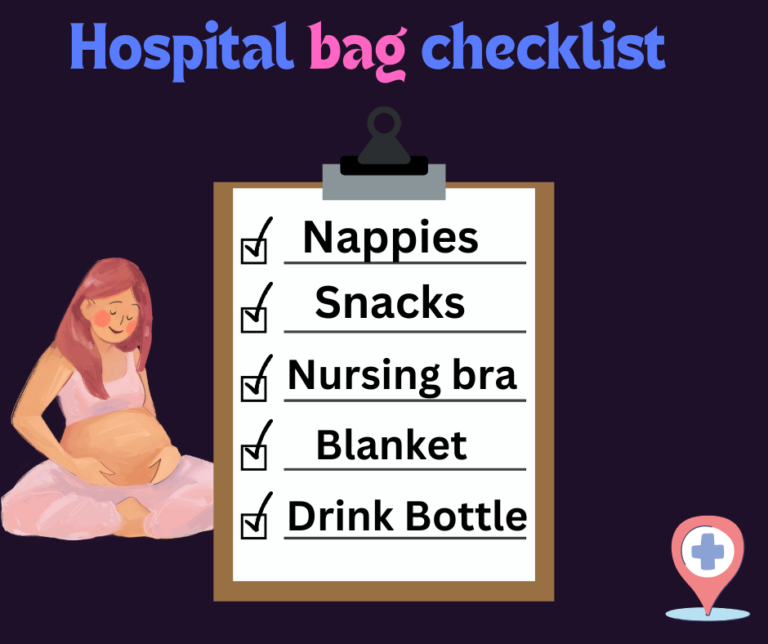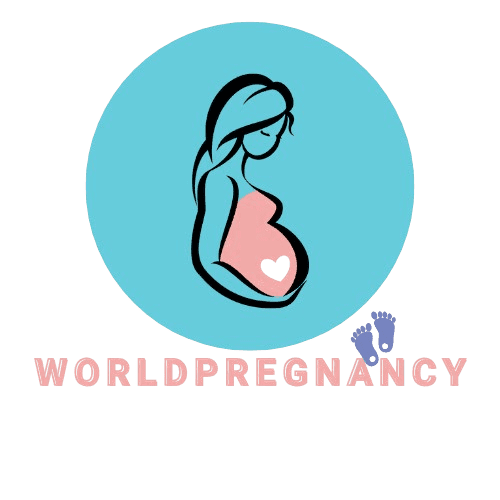Ultimate Hospital Bag Checklist for Expecting Moms | Be Prepared.
Prepare for your big day with our comprehensive hospital bag checklist. Find out what essentials you, your baby, and your partner need to pack for a stress-free hospital stay!

Hospital Bag Checklist for Mom
1. Essential Documents
Before you focus on packing clothing and toiletries, make sure you have all the necessary paperwork:
- ID & Insurance Information: Bring your personal identification (driver’s license, passport), health insurance card, and any required registration forms from your hospital.
- Birth Plan: If you have a birth plan, it’s a good idea to bring a printed copy so you can easily share it with your birth team.
- Hospital Registration Forms: Some hospitals require pre-registration before arrival, so check ahead and bring any forms with you.
- Emergency Contact Information: Make sure your partner and other important contacts are easily accessible in case of any last-minute emergencies.
2. Clothing & Comfort
The hospital will provide some essentials, but having your own clothing can make you feel more comfortable:
- Comfortable Pajamas: Choose loose-fitting pajamas, ideally with a button or zip-front for easy breastfeeding access. You’ll want to be comfortable while also being able to nurse easily.
- Robe: A soft, cozy robe will be great for lounging in the room or walking the halls after labor.
- Underwear: Bring disposable underwear (such as adult diapers) or a couple of pairs of cotton, loose-fitting underwear. You may experience heavy bleeding after delivery, so comfort is key.
- Socks: Hospitals can be chilly, and having non-slip socks will help you move around safely.
- Slippers/Flip-Flops: These will come in handy when walking around the hospital.
- Nursing Bra or Bra Pads: A supportive nursing bra (if you plan to breastfeed) and breast pads (for leakage) are essential.
- Maternity Clothes: Pack something comfortable for the trip home. Consider loose, easy-to-wear clothes like leggings, sweatpants, or dresses that will fit your postpartum body.
3. Toiletries & Personal Care
While the hospital will provide basic hygiene items, it’s nice to have your favorite personal products:
- Toothbrush & Toothpaste: Make sure you have a toothbrush and toothpaste to feel fresh after long hours.
- Shampoo & Conditioner: Bring your own shampoo and conditioner for a refreshing shower.
- Body Wash or Soap: Choose a gentle, soothing body wash or soap to feel refreshed.
- Lip Balm: Hospitals can have dry air, so keep lip balm to avoid chapped lips during labor.
- Face Wash & Moisturizer: A simple cleanser and moisturizer to keep your skin feeling fresh.
- Deodorant: A must-have for staying fresh during labor and the postpartum days.
- Hairbrush & Hair Ties: Tie your hair back during labor or to avoid tangles.
- Makeup (Optional): Some women like to have makeup to freshen up after delivery. A light face wash, mascara, and lip balm may be all you need.
- Towel (Optional): Some hospitals provide towels, but if you prefer your own, consider bringing one.
4. Comfort & Relaxation Items
- Pillow & Blanket: Hospital pillows may not be the most comfortable, so bring your own pillow and blanket to ensure a better rest.
- TENS Machine (Optional): If you plan on using a TENS machine for pain relief, check with the hospital to see if it’s allowed.
- Music Playlist or Bluetooth Speaker: Bring a music playlist, calming sounds, or soothing playlists for relaxation during labor.
- Snacks & Drinks: Labor can take time, so bring non-perishable snacks and drinks (especially for your support person). Hospitals often have restrictions on eating during active labor, but it’s good to have something on hand for after the birth.
- Water Bottle: Staying hydrated is important, so a reusable water bottle with a straw can make drinking easier during labor.
5. Electronics
- Phone & Charger: Your phone is essential for communication, photo-taking, and entertainment. Bring a long phone charger, preferably one with a long cord so it can reach from the hospital bed.
- Camera: If your phone camera isn’t enough, you might want to bring a separate camera to document the birth and your baby’s first moments.
- Laptop/Tablet: If you’re planning to stream movies or need something to occupy your time during your hospital stay, bring a tablet or laptop.
- Portable Power Bank: This can be very helpful if outlets are limited or your phone is being used for pictures and updates.
6. Postpartum & Maternity Support
- Perineal Care Kit: While the hospital often provides some postpartum supplies, you may want your own items like a perineal bottle, witch hazel pads, or numbing spray.
- Breastfeeding Pillow: A breastfeeding pillow can be a lifesaver for proper posture and comfort when nursing.
- Nipple Cream: Sore nipples are common during early breastfeeding, so a soothing nipple cream like lanolin will help with recovery.
- Postpartum Pads: Hospitals will typically provide heavy-duty pads, but you may prefer a different brand for your comfort.
Hospital Bag Checklist for Baby
1. Baby Clothing
- Onesies (2-3): Soft, comfortable onesies for the baby to wear after birth. Consider bringing both long-sleeve and short-sleeve options based on the season.
- Going-Home Outfit: A cute, comfortable outfit for your baby to wear home. Be sure it’s weather-appropriate (a warm baby blanket for cold weather).
- Baby Hat: Hospitals often put a hat on your baby to keep their head warm after birth. Bring one to use at discharge.
- Socks/Booties: To keep baby’s feet warm.
- Swaddle Blankets: Soft blankets for swaddling your baby. Many hospitals offer swaddling, but having your own is a great option.
2. Feeding Supplies
- Nursing Pillow: A nursing pillow can be helpful for breastfeeding, ensuring proper latch and support for you and your baby.
- Breastfeeding Pads: If you’re nursing, you may leak milk, so bring some pads to absorb any leakage.
- Formula & Bottles: If you plan to formula-feed, pack a couple of bottles and your preferred formula, just in case.
- Burp Cloths: A few cloths to clean up any messes after feeding.
3. Baby Care Essentials
- Diapers (2-3): The hospital will provide some, but you might want to bring your preferred brand.
- Baby Wipes: Gentle wipes for cleaning baby during diaper changes.
- Diaper Cream: A small tube of diaper cream to help prevent any rashes.
- Baby Shampoo & Body Wash: If you want to wash your baby with your own gentle products.
- Nail Clippers or Baby Files: Newborn nails can grow fast and be sharp.
4. Baby’s Essentials for Discharge
- Car Seat: Make sure the car seat is properly installed in your vehicle before going to the hospital. The hospital will require you to have a car seat before discharging your baby.
- Blanket or Cover: For extra warmth or protection during the trip home.
Hospital Bag Checklist for Your Partner/Support Person
1. Comfort Items
- Comfortable Clothes: A change of clothes and extra layers for your partner or support person.
- Snacks & Drinks: Energy bars, bottled water, or any preferred snacks to keep them comfortable during long hours at the hospital.
- Toiletries: Toothbrush, deodorant, and other personal hygiene items to stay fresh.
- Phone Charger: Don’t forget to pack a charger for your partner’s phone.
- Camera: If your partner is taking photos or videos, make sure to bring the camera and spare batteries.
2. Important Items
- Health Insurance Information: Keep the insurance card, ID, and any registration forms for quick access.
- Cash/Change: For parking, vending machines, or any other small expenses.
- Support Materials: Birth plan or any other relevant documents to share with your birth team
Optional Items
- Essential Oils or Diffuser: If you plan to use scents like lavender to relax during labor.
- TENS Machine: Some women use TENS machines for pain relief, but check with your hospital to ensure it’s allowed.
- Entertainment: Books, magazines, or anything to keep you entertained while waiting.
Final Tips
- Double-check hospital policies: Some hospitals will provide many items, including diapers, postpartum pads, and even baby clothes. It’s good to check ahead.
- Pack early: Aim to pack your bag by 36 weeks, so you don’t feel rushed if you go into labor early.
- Stay flexible: Every labor and delivery is unique, so while you can plan, things may change. Stay open to the experience!
